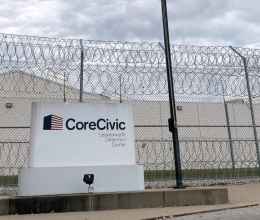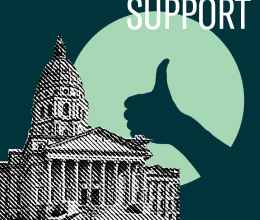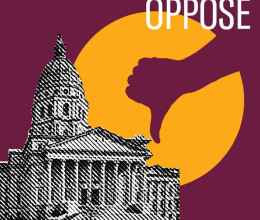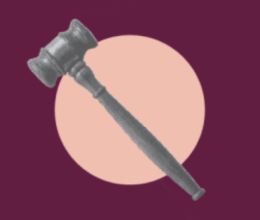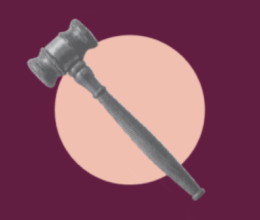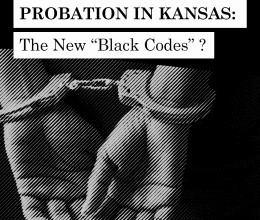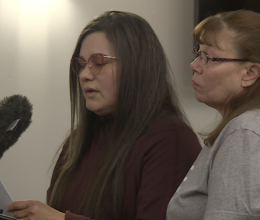
August 20, 2020
Dear Chief Justice Luckert,
We write to request that the Kansas Supreme Court immediately stop the assessment and collection of all fees and fines imposed on youth in the juvenile legal system and their families, in response to the urgent need for economic relief due to the COVID-19 emergency.[1]
Juvenile fees and fines are a regressive and racially discriminatory tax on low-income communities and communities of color.[2] These same communities are being disproportionately impacted by the COVID-19 public health and economic crisis, including contracting and dying from the virus at higher rates, and more likely to lose income, experience housing and food insecurity, and lack access to medical care.[3]
Juvenile fees and fines can quickly add up to thousands of dollars, and often result in devastating consequences for families, including wage garnishment, bank account levies, property liens, and tax refund intercepts. A $500 bill is a financial emergency for many families[4]—in the midst of the COVID-19 crisis, it is a potential catastrophe.
Because juvenile fees and fines undermine youth rehabilitation, increase recidivism, and generate little or no net revenue, many states and cities have already begun to end these counterproductive practices.[5] California, Maryland, Nevada, and New Jersey, and local jurisdictions such as Kansas City, Madison, Memphis, New Orleans, and Philadelphia have permanently eliminated one or more juvenile fees and fines.[6]
In this time of crisis, the focus should be on immediately suspending fees, fines, and negative consequences for nonpayment. More than 140 groups across the country and political spectrum have called for a national moratorium on juvenile fees and fines.[7] At the federal level, the House of Representatives passed the HEROES Act (H.R. 6800), which includes provisions that incentivize courts to stop charging and collecting juvenile fees and fines, and suspend court or probation requirements for youth to attend and pay for programs that violate required social distancing or stay at home orders.[8]
Some state courts have already acted in response to COVID-19. Oregon suspended collections fees, referrals to state revenue departments and private collection agents, new garnishment orders, late fees, and delinquency notices.[9] Indiana has stopped all garnishments of any stimulus payments.[10] More information on actions taken on the state and local level to reduce the economic burden of juvenile fines and fees during this crisis can be found here.
Given the ongoing financial harm to families caused by the public health and economic crises, including substantial loss of income and inability to pay rent, food, utilities, and other necessities, we urge you to take the following actions:
- Assessment: Immediately stop the assessment of juvenile fees and fines.
- Collection: Immediately stop collection of juvenile fees and fines, stop all automatic payments, suspend payment deadlines, and suspend all court-ordered attachments, garnishments, levies, liens, redirects, and tax refund intercepts. This should include the immediate cessation of juvenile warrant enforcement for unpaid fees and fines.[11]
- Counsel: Automatically appoint counsel for youth without requiring an assessment of indigence, or direct the local designee to do so.
- Referrals: Stop and recall referrals of unpaid juvenile fees and fines to state taxing and collecting authorities and private collection agencies for garnishments, levies, liens, redirects, and tax refund intercepts.
- Dismissal: Dismiss all cases where the only remaining matter is outstanding debt.
- Outstanding Fees and Fines: Write-off all outstanding juvenile fees and fines and discharge, vacate, or declare as satisfied all liens, fee agreements, and civil judgments.
- Warrants: Vacate arrest warrants for failure to pay fees and fines.[12]
- Notification: Notify youth and families of new policies and procedures suspending juvenile fees and fines, including updating public-facing websites and payment portals.
- Permanent Relief: Work to make these actions permanent.
The Kansas Supreme Court needs to act immediately to relieve families from the hardship of juvenile fees and fines, to protect Kansas’ most vulnerable families, and ensure all Kansans can emerge from this crisis more resilient, healthy, and hopeful.
Sincerely,
ACLU of Kansas
Kansas Appleseed Center for Law and Justice
Juvenile Law Center
CC: State Court Administrator
[1] State law may require juvenile courts to impose certain fees and fines. This letter and its recommended actions apply to all fees and fines that are within the discretion of the court to suspend.
[2] U.S. Comm’n on Civil Rights, Targeted Fines and Fees Against Communities of Color (2017), https://www.usccr.gov/pubs/2017/Statutory_Enforcement_Report2017.pdf; Policy Advocacy Clinic, Univ. of Cal., Berkeley Law Sch., Making Families Pay (2017), https://www.law.berkeley.edu/wp-content/uploads/2015/12/Making-Families-Pay.pdf; U.S. Dep’t of Justice, Civil Rights Div., Investigation of the Ferguson Police Department (2015), https://www.justice.gov/sites/default/files/crt/legacy/2015/03/04/ferguson_findings_3-4-15.pdf.
[3] COVID-19 in Racial and Ethnic Minority Groups, U.S. Centers for Disease Control & Prevention, https://www.cdc.gov/coronavirus/2019-ncov/need-extra-precautions/racial-ethnic-minorities.html (last visited May 14, 2020); Mark Hugo Lopez et al., Financial and Health Impacts of COVID-19 Vary Widely by Race and Ethnicity, Pew Research Ctr. (May 5, 2020), https://www.pewresearch.org/fact-tank/2020/05/05/financial-and-health-impacts-of-covid-19-vary-widely-by-race-and-ethnicity/; Samantha Artiga et al., Communities of Color at Higher Risk for Health and Economic Challenges Due to COVID-19, Kaiser Fam. Found. (Apr. 7, 2020), https://www.kff.org/coronavirus-covid-19/issue-brief/communities-of-color-at-higher-risk-for-health-and-economic-challenges-due-to-covid-19/.
[4] Bd. of Governors of the Fed. Reserve Sys., Report on the Economic Well-Being of U.S. Households in 2018 (2019), https://www.federalreserve.gov/publications/files/2018-report-economic-well-being-us-households-201905.pdf.
[5] Alex Piquero & Wesley Jennings, Research Note: Justice System-Imposed Financial Penalties Increase the Likelihood of Recidivism in a Sample of Adolescent Offenders, 15 Youth Violence & Juv. Just. 325 (2016), https://doi.org/10.1177%2F1541204016669213; Policy Advocacy Clinic, Univ. of Cal., Berkeley Law Sch., Making Families Pay (2017), https://www.law.berkeley.edu/wp-content/uploads/2015/12/Making-Families-Pay.pdf; Juvenile Law Ctr., Debtors’ Prison for Kids? The High Cost of Fines and Fees in the Juvenile Justice System (2016), https://debtorsprison.jlc.org/documents/JLC-Debtors-Prison.pdf.
[6] S. 190, 2017-18 Reg. Sess. (Cal. 2017); H. 36, 2019-20 Reg. Sess. (Md. 2020); S. 48, 2018-19 Reg. Sess. (N.J. 2019); A. 439, 2019 Reg. Sess. (Nev. 2019); Orleans Parish Juvenile Court, LA. Standing Policy on Juvenile Administrative Fees (2018), https://drive.google.com/file/d/18IQVfvHmO8rvSdhMLf7Pjr7Iku1cdNiT/view; Philadelphia, PA: Resolution 161029 (2016),
[7] Juvenile Law Ctr. et al, Call for a Nationwide Moratorium on Juvenile Fees and Fines (last updated May 13, 2020), http://bit.ly/stop-juve-fees.
[8] HEROES Act, H.R. 6800, 116th Cong. §§ 191107-191108 (2020).
[9] State of Oregon, Judicial Department, Oregon State Courts Ease the Burden of State Court Fines, Fees, and Collections During the COVID-19 Pandemic, https://www.law.berkeley.edu/wp-content/uploads/2020/04/Oregon-Judicial-Department-Fines-and-Fees.pdf.
[10] Indiana Supreme Court, Published Order In re Petition to the Indiana Supreme Court to Engage in Emergency Rulemaking to Protect CARES Act Stimulus Payments From Attachment or Garnishment From Creditors
https://www.in.gov/judiciary/files/order-other-2020-20S-MS-258a.pdf.
[11] This would necessitate amending Kansas Supreme Court Administrative Order 2020-PR-049 (May 1, 2020), which deems juvenile warrant enforcement an “essential function” during the COVID-19 crisis.
[12] See item 2 and note 11, supra.
